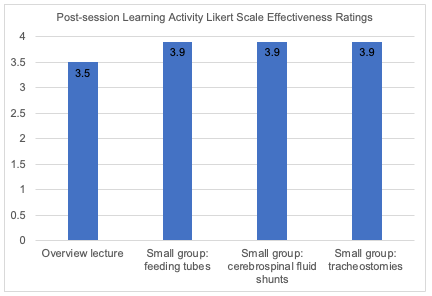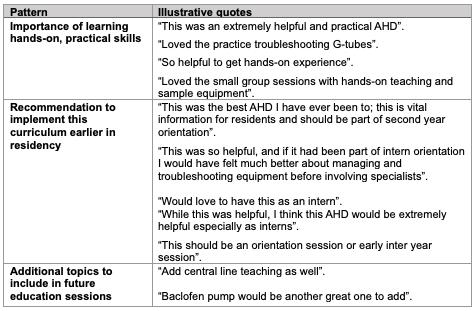Children with Chronic Conditions
Session: Children with Chronic Conditions 3
288 - Caring for Children with Medical Complexity (CMC) who require technology: A Curriculum for Senior Pediatric Residents
Friday, May 3, 2024
5:15 PM - 7:15 PM ET
Poster Number: 288
Publication Number: 288.177
Publication Number: 288.177
- HF
Hannah E. Friedman, MD (she/her/hers)
Instructor/fellow
University of Colorado School of Medicine
Denver, Colorado, United States
Presenting Author(s)
Background: Children with medical complexity (CMC) have high healthcare resource utilization. Thus, pediatricians will frequently encounter these patients in a variety of settings during and after residency. Many of these children require medical technology; however, many residents may lack competency and comfort in managing problems that arise with medical technology highlighting the need for curriculum development.
Objective: To develop, implement, and evaluate a curriculum for senior pediatric residents (PGY-2/PGY-3) focused on managing problems with medical technology in CMC.
Design/Methods: We developed and implemented an educational activity that was incorporated into the existing residency program’s Academic Half Day (AHD; 3-hour block conference) curricular model in August 2023. Informed by self-determination theory as a conceptual framework, the curriculum was co-created by a complex care pediatrician and pediatric sub-specialists (general surgery, neurosurgery, ENT/pulmonology). This AHD consisted of four learning activities: a large group overview lecture of caring for CMC and three rotating small group case-based and hands-on discussions focused on problems with feeding tubes, cerebrospinal fluid shunts, and tracheostomy tubes. Small group learning was co-facilitated by a complex care pediatrician and a pediatric sub-specialist. Residents were asked to complete a post-session on-line survey about the perceived effectiveness of teaching activities (4-point Likert scale; 1=not at all effective, 4=very effective). Findings were analyzed with descriptive statistics and content analysis of answers to open-ended questions.
Results: Of 66 senior residents in the program, 36 were scheduled to attend this AHD (n=17 session 1; n=19 session 2). Twenty-one residents completed the survey. Residents found teaching activities to be effective: overview lecture 3.5/4, feeding tubes 3.9/4, cerebrospinal fluid shunts 3.9/4, and tracheostomies 3.9/4 (Figure 1). Identified themes from free text were: 1) importance of hands-on learning, 2) potential value of implementing this curriculum earlier in residency during the intern year, and 3) additional topics such as central lines and Baclofen pumps to include in future education sessions (Table 1).
Conclusion(s): Senior pediatric residents found a curriculum focused on managing medical technology in children with medical complexity to be helpful and effective. Next steps include consideration of moving this curriculum to the intern year. Further evaluation is needed to determine how residents are applying learning from this educational activity to their patient care.


